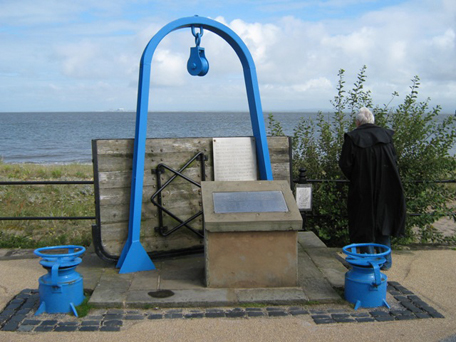
by Charlotte Starkey.
Fleetwood …. not a name to conjure up the romance of fishing perhaps, but indelibly shaped by fishing since the early nineteenth century. Battered by Beeching who cut its rail link in the 1960s; by the Icelandic Cod War of the 1970s; then by Common Market fisheries quotas. Yet many, who now fish with rod and line from shore, beyond the blue memorial, still remember the once-mighty Fleetwood trawling fleet, at twilight, in convoy, returning from hazardous voyages to fishing grounds in unyielding northern seas and oceans. Silhouetted in a world of silent steel-grey skies slashed with sunset crimsons in the sweep of Morecambe Bay, they edged inshore to the estuary of the River Wyre; vessels like the Harriet (built in 1893) insistently, expertly finding the channel of the channel between the treacherous sandbanks. Family and friends waved from the quayside – the menfolk on board tired, hungry for home, worrying about the value of the catch, relieved to be back safely. Those vessels brought a mysterious sense of other worlds into port – a floating society of toughened men who had lived, worked, slept, argued, struggled and survived – to come home again.
I was a young teacher then and always found it deeply moving. The pulse of throbbing machinery spoke a language of power and vulnerability simultaneously. So many lives depended on the sound of those engines never fading – the journey, the casting and hauling of nets, the crank of the winches, the meagre heat of the cabins. Those trawlers ploughed the waves of hostile seas and sailed the tranquil waters following storm. They knew exotic-sounding places – Viking, Finisterre, Cromarty, Faeroes, and especially Benbecula. He was always some old kindly sea captain I heard as child in the shipping forecast: he rode the horses of the waves. The trawlers themselves, who knew these figures as friends, had the mysterious identity of all ships – riveted, battered, rusted tubs as some were with wonderful names like Jacinta – a hulk named after a hyacinth! and it captivated me. I could understand why the lads I taught stowed away – well, some of them did. Why read the story of the old sailor of Coleridge when, for heavens sake, ‘I could be him! Not the grand liners of Liverpool, nothing like the huge modern container vessels that enter ports like Rotterdam now. These trawlers were small in comparison but working in dangerous, icy waters, hastily repaired, riveted, welded together, like their nets when broken, obeying the rhythms of unforgiving elements, fighting for a living in difficult times.
On the quayside now, where trawlers no longer pass, the memorial to the more than 350 seafarers from 1913 onwards who lost their lives at sea sailing from Fleetwood marks the spot where families once stood apprehensively to wave goodbye, and then wave home with huge relief, their fisher men. It is a poignant landmark on this sunny autumnal afternoon almost one hundred years after the name of the first trawler listed on the memorial sank – the Belovar (‘1913 – ‘All Hands’ it reads simply) off the Isle of Barra – though many vessels had sunk before her and many more to follow.
And those lads who dreamt of distant oceans, trawling seas that drew them like the gravitational pull on the tides – they left their marks too, especially one. For him school was an interruption to his dreams, his ambition – to be a ‘deckie’. I remember his final day at school: he arrived, midway through the lunch break, striding purposefully towards the staff-room door.
What on earth have you got there? I asked looking at a huge dripping parcel, wrapped in soggy newspaper carried in his outstretched arms. He ignored my question:
Is Mrs – in the staff-room?
I knew.
She likes fish, he said determinedly.
Where did you get it? I demanded –
Ware’ouse – last night – Bin in ‘ freezer at ‘ome till ‘alf an ‘our ago.
I loved the honesty; thought of ‘health and safety’ issues – then forgot them.
Someone here to see you! I called through the staffroom door.
You do not see cod like that anymore. His father, in frozen wastes, had trawled the oceans of the world for mammoth catches – and his son ends up ‘finding’ three massive codfish in the dockside freezer for his favourite teacher in an act of courtly chivalry. Fishing has marked effects on people. Its rhythms seem different from the frenetic tempo of ‘normal’ working life. For me, as I look at that simple, powerful memorial in a town of fishing, I hear the haunting chords of Peter Maxwell Davies’s Farewell to Stromness and I see those Fleetwood trawlers riding the waves of the Bay to this day.